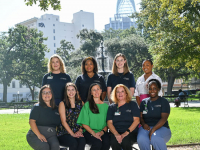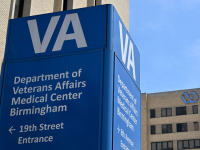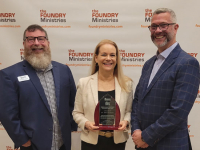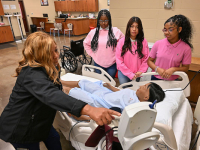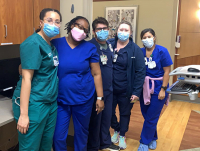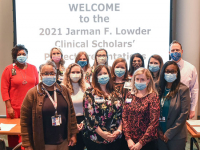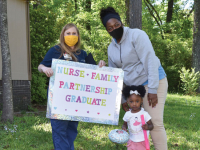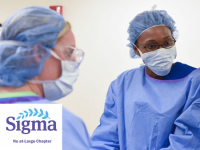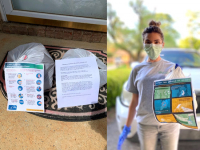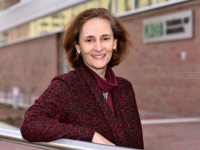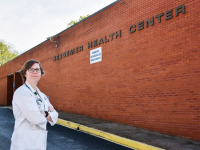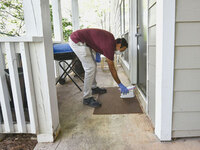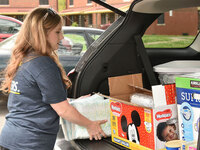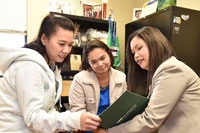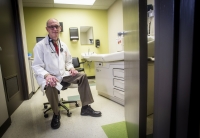
By Erica Techo
The COVID-19 pandemic and other challenges from 2020 are shining a light on hardships, gaps in care and the need to come together. For the UAB School of Nursing and its partners across the community and globe, these challenges continue to build upon strong partnership foundations, opportunities to collaborate and the importance of communication.
"Partnerships start with a strong relational foundation that has been built over time, and that relational foundation is one of trust, mutual understanding and shared vision,” said Jane H. Brock-Nightingale Endowed Professor and Associate Dean for Clinical and Global Partnerships Maria Shirey, PhD, MBA, RN, NEA-BC, ANEF, FACHE, FAAN. "When you have these things together in a crisis such as COVID-19, it's people who have strong bonds who can muster the resources to work together in a different way to adapt to ever changing needs and situational crises in the health system.”
As the pandemic evolved, the School adapted community clinics to provide care via telehealth and contactless medication and supply drop-offs. The UAB Nursing Partnership between UAB Medicine, the University's health system, and the UAB School of Nursing opened new doors for students to gain clinical experience and established a new normal for teamwork among the nurses, faculty and nursing students in the school and the nursing staff at UAB Medicine during COVID-19 surge staffing. Through its PAHO/WHO Collaborating Center for International Nursing, the School also reached out to international partners with educational resources and new courses.
"We are all part of this tapestry. We exist together in one purpose, and that is to create value and create a culture of health and well-being,” Shirey said. "The fact that these partnerships already existed and were already so strong meant we could pivot quickly and continue to care for our communities, both locally and globally.”
Any adjustments also leaned toward enhancing the strength of partnerships, added Dean and Fay B. Ireland Endowed Chair in Nursing Doreen C. Harper, PhD, RN, FAAN.
"The UAB School of Nursing has long prided itself on being present in the community and partnering with the community,” she said. "While the COVID-19 pandemic presented challenges to our partnerships, an ability to quickly adapt meant we could continue to be present in the community and continue to improve health overall, just in new and innovative ways that fit new circumstances."
"In The Future of Nursing 2020-2030 report, the National Academy of Medicine recognized the importance of placing value in community and public health nursing,” Harper continued. "These nurses, and these clinics, are the foundation for health equity in so many communities and are the frontlines to investing in better health, rather than only investing in treating illness.”
STAYING CONNECTED
When reflecting on the twists and turns since early 2020 and adjustments regarding the COVID-19 pandemic, a common theme arises—the threads that connect the UAB School of Nursing to its partners in the community. The strength of these threads were tested and proven strong as adjustments were made to craft new models of care and to bolster existing systems.
One of the strongest connections was across the bridge at UAB Hospital. In late 2020, UAB Medicine issued a call for help—a potential COVID-19 surge was on the horizon, and after a year of nonstop action at the hospital, they needed extra hands-on-deck for both clinical work and vaccine administration.
"2020 was a whirlwind year to be honest,” said Assistant Professor Summer Powers, DNP, CRNP, ACNP-BC, AACC (MSN 2006, DNP 2009) who also has a faculty practice at UAB Hospital. "I was giving an exam when the email came through that the hospital was requesting our help as nurses, and it took me a second to process that. Even though the word 'partnership' didn't come to mind right away, I recognized that these are our collaborative partners, and they needed our help.”
Powers was one of 125 UAB School of Nursing faculty and students who answered the call, taking up roles at the Hospital to continue work and to support nurses and other workers. Over the course of several weeks, the School of Nursing contributed to 7,359 hours of work, covering 770 shifts and having tens of thousands of patient encounters. The work extended through the spring semester as faculty and students across all programs accounted for almost 50,000 COVID vaccine encounters.

"The contributions of UAB School of Nursing faculty and students during the COVID-19 surge staffing at UAB Hospital was just one example of the strength of this partnership,” Harper said. "Not only were our teams able to quickly come together and develop a plan to supplement staffing, but we were also able to provide vital clinical hours to our students, complete any necessary refresher training, and ultimately take care of the community.”
"The established relationship and trust between our clinical partners and our School was already present,” Powers said. "With that in place, it was less challenging to establish plans and develop just-in-time training for our faculty and students to join the surge workforce. Using our resources at the UABSON allowed our hospital partners to continue to focus on their staff and other individuals coming on board. We got to be one important piece of the larger puzzle.”
Quick communication was also key in adapting practices in the community, as clinics and programs dedicated to health equity moved to modes of communication that included less in-person contact.
For the Nurse Family Partnership of Central Alabama, this meant modifying care models and utilizing established resources to help families. As an organization, the NFP provides resources and health care to first time, low-income mothers through a nurse home visitor. During home visits, the nurse can help mothers connect with employment resources, to improve housing or for mental health care, and they also provide regular health check-ups for the mother and baby through the infant's first two years.
When COVID-19 meant the University and its clinics moved to a remote basis, this also meant clients in NFP faced additional needs.
"One of the things we noticed right away was that a good percentage of our clients lost their jobs initially,” said Assistant Professor Candace Knight, PhD, RN (BSN 1997, PhD 2013), director of the Nurse Family Partnership of Central Alabama. "A lot of our clients are in the food service industry and retail, and some faced dire situations regarding basic needs. We were able to reach out to our community partners, including Children's Policy Council's Safe Care, and they provided us with formula for families. Another partner, the Junior League of Birmingham, gave us loads of diapers. We were able to meet a great need of the moms and their babies.”
Other nurse-managed clinics also adapted, said Associate Professor and Assistant Dean for Clinical and Community Programs Michele Talley, PhD, CRNP, ACNP-BC, FAANP (MSN 2005, PhD 2015). These clinics provide vital resources to underresourced patients facing heart disease, diabetes and other chronic illnesses, helping improve their health and the overall health of the community.
Prior to COVID-19, the clinics had in place crucial community connections, including local foodbanks, behavioral health resources, employment resources and more they were able to tap into as the pandemic continued. And for the clinics, there are other behind-the-scenes resources providing perspectives on their work—brainstorming and team building.
"We're constantly having a dialogue among all nurse-managed clinics to see what we need, how we can work together to improve care and how we can evaluate the impact we're having on our community,” Talley said. "It's so easy to overlook the importance of this sort of brainstorming and team building. It's so valuable to have this lived experience and be able to provide insight to others. Even if the UAB School of Nursing doesn't have a clinic in a specific community, we're able to advise other clinics to help reach patient populations throughout the state and region.”
And the COVID-19 pandemic highlighted the importance of this discussion and network of clinics. As each clinic worked to adapt its practices, they could brainstorm together in order to see which practices best fit the patient population and community.
"These community-based clinics are strong proponents of health equity, as they care that not only meets the needs of the community, but also incorporate team-based, holistic approaches. The individuals who work in our nurse-managed clinics, and in the Birmingham community and beyond, are advocates for patient health and continue to advance health equity for all,” Harper said.
For some—including the PATH (Providing Access to Healthcare) Diabetes Clinic—this meant transferring care to a telehealth setting. Patients could have regular check-ins with interprofessional care providers, and set up times and locations to pick up important supplies such as insulin in a way that fit their personal resources. For others, including the HRTSA (Heart FailuRe Transitional Care Services for Adults) Clinic, this meant continuing in-person care but carefully coordinating guidelines to maintain social distancing, providing appropriate personal protective equipment and more.
"It improved collaboration, it improved communication, it improved coordination,” Talley said. "This may have taken us a long time to figure out before COVID, but the pandemic and urgency to pivot care to meet our patients' needs ultimately helped us to work better together.”
"Closing these clinics was never an option, as they provide care to underresourced populations around the city of Birmingham and the state,” Shirey said. "We're able to keep our patients healthy preventing hospital readmittance or chronic health issues—it's a way to improve overall health in the community and to reduce the financial burden on health systems,” Shirey said. "We're providing personalized care, enhancing quality of life, and supporting our patients to contribute within their families and communities.”
STRENGTHENING BONDS

For the School's international partnerships, technology played an important role in connecting groups across oceans as the pandemic raged. Previously, many international connections came through International Visiting Scholars and opportunities for UAB School of Nursing faculty and students to conduct research and forge connections abroad. In a socially distanced, more remote or hybrid setting, worlds opened up for more online courses, webinars and more.
"We had to rethink how we approach our partnerships and global commitments. Obviously virtual discussions and technology were already part of our work life,” said Associate Professor and Co-Director of the School's PAHO/WHO Collaborating Center for International Nursing Adelais Markaki, PhD, RN, PHCNS-BC, FAAN. "Thankfully at UAB, we have graduate programs that are already distance-accessible, so it was not a major adjustment in terms of that, but it was a major challenge in helping our global partners who don't have that type of technology or are lacking this expertise.”
One such connection came through a new online course entitled "Quality Improvement in Nursing and Midwifery Educational Programs.” This free course was launched along with an international, bi-lingual webinar in Fall 2020. It provides important information for quality improvement practices that can be adapted based on different resources, extending knowledge from UAB to our international partners.
"We're all experiencing the same situation, but we are not equally well equipped to face the situation. We need to share our strong points, our resources, in order to help level the field,” Markaki said. "Our PAHO/WHO's work is leveling the field for nurses and midwives across the PAHO region so they have the opportunity to come out of the storm with as few losses and as many gains as possible.”
Even newer partnerships were able to adapt quickly as a result of strong existing connections. In late 2019, the School first connected with i3 Academy, a no-cost charter school in Birmingham. The partnership began as an opportunity to partner with the School as a way to provide check-ups for the elementary school aged children, while also providing clinical hours and pediatric experience to UABSON students.
As COVID-19 restrictions fell into place, a few initiatives that would have been on-campus had to be modified. The School of Nursing and partnership coordinator Associate Professor Tedra Smith, DNP, CRNP, CPNP-PC, CNE, CHSE (MSN 2004, DNP 2011), however, moved forward with informative videos, virtual Q&A sessions and socially distanced community health clinics.
"We didn't just throw our hands up and say, 'Oh, it's COVID so we can't do anything. We'll try again next year,'” Smith said. "We worked to address the School's needs and the community's needs. We made modifications so we could still assist, and we showed our commitment to the partnership.
"COVID-19 even provided opportunities for growth,” Smith continued. "If COVID wasn't here, we would not have been able to create these virtual opportunities for outreach, and we might not have been able to involve so many groups and pediatric faculty members in the partnership.”
Moving forward, the i3 partnership is stronger for the challenges it faced, Smith said. With case numbers increasing, especially for the unvaccinated, Smith said while she is still planning to bring nursing students to i3 Academy for hearing and vision screenings, health education and more, she also is preparing to pivot to telehealth at a moments notice. i3 Academy enables students to take nursing education beyond classroom. Discussions of social determinants of health and health equity, and understanding how those concepts can be applied in communities helps students build their knowledge base on how to act as advocates for child health in Birmingham and across the nation.
The challenges and opportunities introduced in 2020 also pose an opportunity to reflect on the strengths of the School's partnerships and what they will look like moving forward, Shirey said.
"COVID just happened to be the accelerant of the moment. COVID is just one pandemic. We're going to have other pandemics, we're going to have other issues, we're going to have other challenges,” Shirey said. "But if we continue to stoke the fires in that strong relational foundation, that will put us in the position to strengthen our partnership work to provide and improve care.”

